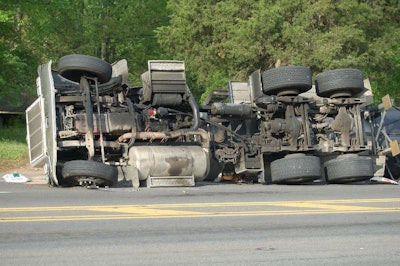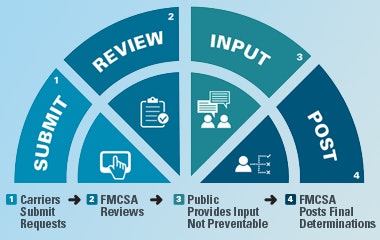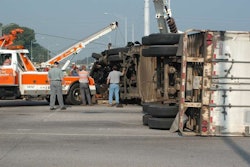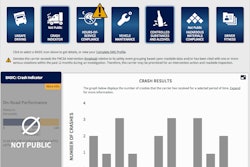
 Owner-operators will soon be able to dispute preventable crash rulings for certain crash types to have the ruling potentially overturned to “not preventable.”
Owner-operators will soon be able to dispute preventable crash rulings for certain crash types to have the ruling potentially overturned to “not preventable.”Beginning Aug. 1, owner-operators will be able to dispute certain crashes that were ruled non-preventable and possibly have those crashes removed from their Compliance, Safety, Accountability scores. A new DOT pilot program will allow crashes to be reviewed, potentially deemed non-preventable and removed from carriers’ CSA ratings.
One of the trucking industry’s biggest issues with the Compliance, Safety, Accountability Safety Measurement System has been the use of all crashes, regardless of preventability, against carriers in their safety ratings.
The Crash Preventability Demonstration Program will allow carriers to send requests for data reviews (RDRs) to the Federal Motor Carrier Safety Administration to evaluate the preventability of certain crashes. RDRs can be made through the existing DataQs data correction system.
If a preventable crash ruling is overturned to “Not Preventable,” law enforcement will be able to see a carriers’ Crash Indicator BASIC percentile both with and without the crash, along with a note indicating FMCSA reviewed the crash and determined it was non-preventable.
Crashes deemed to be non-preventable during the pilot program will still appear in the CSA SMS, but won’t count against the carrier. The agency says it believes it is important to display all crashes, regardless of the preventability determination, to provide “the most complete information regarding a motor carrier’s safety performance record.”

The agency will begin accepting requests on certain types of crashes beginning Aug. 1 for crashes that occurred on or after June 1, 2017. FMCSA will keep the demonstration program open for a minimum of two years.
FMCSA says in a Federal Register notice to be published Thursday, July 27, that crashes challenged through the system would be found “Not Preventable” when documentation submitted with the RDR established that the crash was not preventable. Through the program, FMCSA will accept the following eight crash types for review:
- When a truck was struck by a driver under the influence or a related offense
- When a truck was struck by a motorist driving in the wrong direction
- When a truck was hit in the rear
- When a truck was hit while legally stopped or parked
- When a pedestrian or car drives in front of a truck in an attempt to commit suicide by truck
- When a truck sustains disabling damage after hitting an animal in the road
- When a crash is caused by an infrastructure failure or falling trees, rocks or other debris
- When a truck is hit by cargo or equipment from another vehicle
When reviewing crashes, the agency will use the preventability standard found in federal regulations that states: “If a driver, who exercises normal judgment and foresight could have foreseen the possibility of the accident that in fact occurred, and avoided it by taking steps within his or her control which would not have risked causing another kind of mishap, the accident was preventable.”
When submitting a data review request, FMCSA is not requiring any specific documentation to prove the crash was not preventable, however, carriers can submit dashcam video of the crash, police reports, insurance reports or any other supporting evidence to help the agency decide the preventability of the crash.
When reviewing RDRs, FMCSA can make three determinations: “Preventable,” “Not preventable” or “Undecided.” In the case of an “Undecided” ruling, the agency says the documentation submitted wouldn’t allow for a conclusive decision. A carrier’s SMS rating would include a note that reads, “FMCSA reviewed this crash and could not make a preventability determination based on the evidence provided.”
FMCSA says when a crash is determined to be “Not Preventable,” it will list on the DataQs site the crash report number, U.S. DOT number, motor carrier name, crash date, crash state and crash type. For these crashes, the agency will accept for 30 days documentation or data from the public to refute the finding. New documents and/or data will be reviewed, and a final determination will be made within 60 days, FMCSA says.










